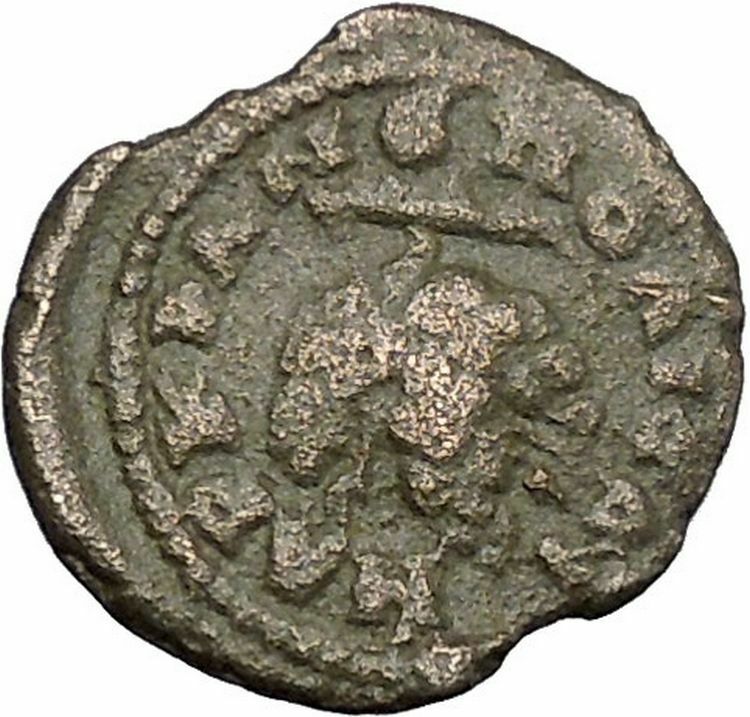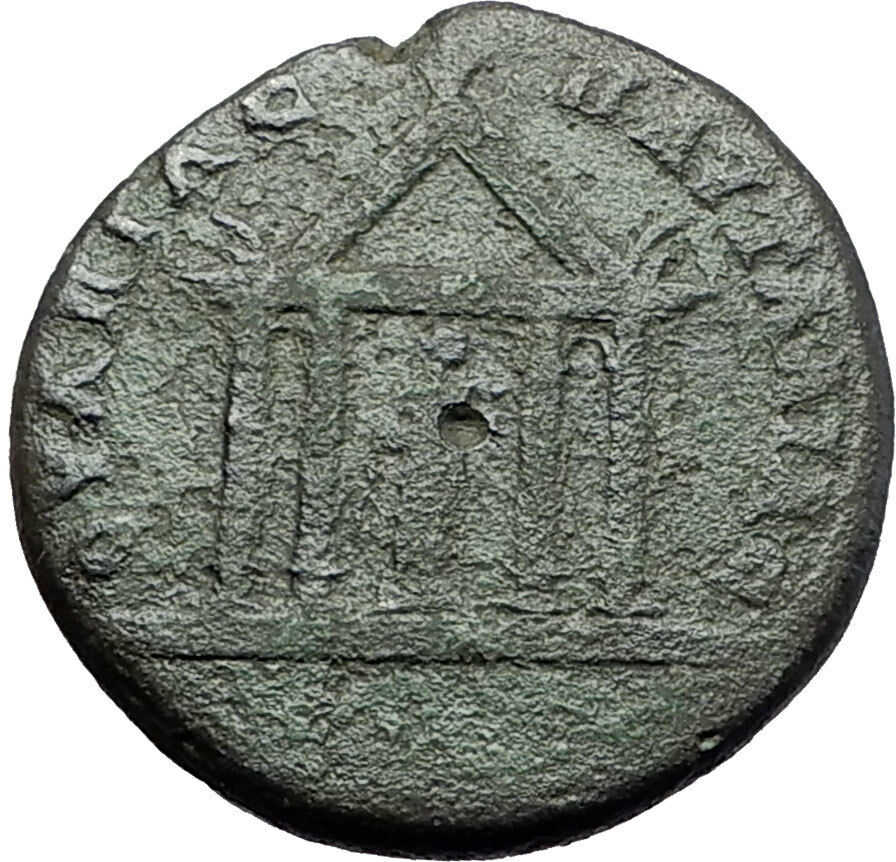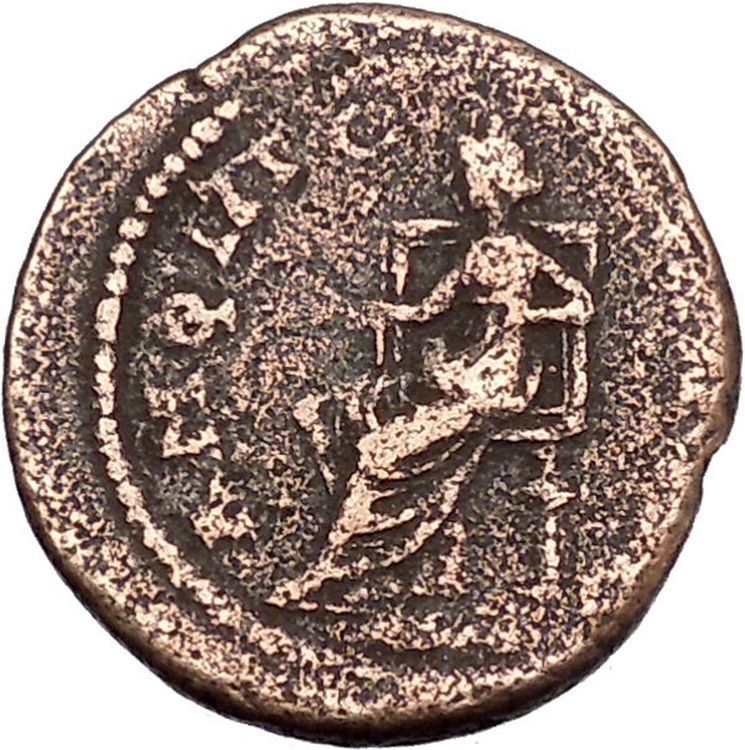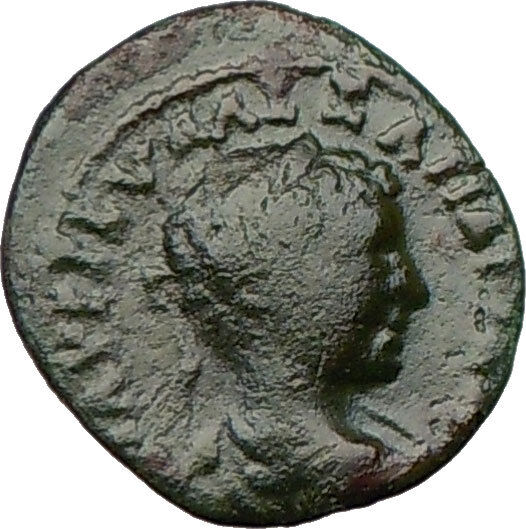|
Gordian III – Roman Emperor: 238-244 A.D.
Bronze 26mm (12.20 grams) of Nicopolis ad Istrum in Moesia Inferior under Sabinius Modestus, consular legate
AVT K M ANT ΓΟΡΔΙΑΝΟC AVΓ, Radiate, draped and cuirassed bust right.
VΠ CAB MOΔЄCTOV NIKOΠOΛЄITΩN ΠPOC ICTPON, Nude Hermes (Mercury) standing left, right foot on rock, caduceus in his right hand and drapery in other.
You are bidding on the exact item pictured, provided with a Certificate of Authenticity and Lifetime Guarantee of Authenticity.
 Hermes is the great messenger of the gods in Greek mythology and additionally as a guide to the Underworld. Hermes was born on Mount Cyllene in Arcadia. An Olympian god, he is also the patron of boundaries and of the travelers who cross them, of shepherds and cowherds, of the cunning of thieves and liars, of orators and wit, of literature and poets, of athletics and sports, of weights and measures, of invention, and of commerce in general. His symbols include the tortoise, the rooster, the winged sandals, the winged hat, and the caduceus (given to him by Apollo in exchange for the lyre). Hermes is the great messenger of the gods in Greek mythology and additionally as a guide to the Underworld. Hermes was born on Mount Cyllene in Arcadia. An Olympian god, he is also the patron of boundaries and of the travelers who cross them, of shepherds and cowherds, of the cunning of thieves and liars, of orators and wit, of literature and poets, of athletics and sports, of weights and measures, of invention, and of commerce in general. His symbols include the tortoise, the rooster, the winged sandals, the winged hat, and the caduceus (given to him by Apollo in exchange for the lyre).
Symbols of Hermes were the palm tree, turtle, rooster, goat, the number four, several kinds of fish, incense. Sacrifices involved honey, cakes, pigs, goats, and lambs.
In the Roman adaptation of the Greek religion (see interpretatio romana), Hermes was identified with the Roman god Mercury, who, though inherited from the Etruscans, developed many similar characteristics, such as being the patron of commerce.
The Homeric hymn to Hermes invokes him as the one “of many shifts (polytropos), blandly cunning, a robber, a cattle driver, a bringer of dreams, a watcher by night, a thief at the gates, one who was soon to show forth wonderful deeds among the deathless gods.”
He protects and takes care of all the travelers, miscreants, harlots, old crones and thieves that pray to him or cross his path. He is athletic and is always looking out for runners, or any athletes with injuries who need his help.
Hermes is a messenger from the gods to humans, sharing this role with Iris. An interpreter who bridges the boundaries with strangers is a hermeneus. Hermes gives us our word “hermeneutics”, the study and theory of interpretation. In Greek a lucky find was a hermaion. Hermes delivered messages from Olympus to the mortal world. He wears shoes with wings on them and uses them to fly freely between the mortal and immortal world. Hermes was the second youngest of the Olympian gods, being born before Dionysus.
Hermes, as an inventor of fire, is a parallel of the Titan, Prometheus. In addition to the lyre, Hermes was believed to have invented many types of racing and the sports of wrestling and boxing, and therefore was a patron of athletes.
According to prominent folklorist Yeleazar Meletinsky, Hermes is a deified trickster. Hermes also served as a psychopomp, or an escort for the dead to help them find their way to the afterlife (the Underworld in the Greek myths). In many Greek myths, Hermes was depicted as the only god besides Hades, Persephone, Hecate, and Thanatos who could enter and leave the Underworld without hindrance.
Hermes often helped travelers have a safe and easy journey. Many Greeks would sacrifice to Hermes before any trip.
In the fully-developed Olympian pantheon, Hermes was the son of Zeus and the Pleiade Maia, a daughter of the Titan Atlas. Hermes’ symbols were the cock and the tortoise, and he can be recognized by his purse or pouch, winged sandals, winged cap, and the herald’s staff, the kerykeion. The night he was born he slipped away from Maia and stole his elder brother Apollo’s cattle.
Nicopolis ad Istrum was a Roman and Early Byzantine town founded by Emperor Trajan around 101-106, at the junction of the Iatrus (Yantra) and the Rositsa rivers, in memory of his victory over the Dacians. Its ruins are located at the village of Nikyup, 20 km north of Veliko Tarnovo in northern Bulgaria. The town reached its apogee during the reigns of Trajan, Hadrian, the Antonines and the Severan dynasty.
The classical town was planned according to the orthogonal system. The network of streets, the forum surrounded by an Ionic colonnade and many buildings, a two-nave room later turned into a basilica and other public buildings have been uncovered. The rich architectures and sculptures show a similarity with those of the ancient towns in Asia Minor. Nicopolis ad Istrum had issued coins, bearing images of its own public buildings.
In 447 AD, the town was destroyed by Attila’s Huns. Perhaps it was already abandoned before the early 400s. In the 6th century, it was rebuilt as a powerful fortress enclosing little more than military buildings and churches, following a very common trend for the cities of that century in the Danube area.The largest area of the extensive ruins (21.55 hectares) of the classical Nicopolis was not reoccupied since the fort covered only one fourth of it (5.75 hectares), in the southeastern corner. The town became an episcopal centre during the early Byzantine period. It was finally destroyed by the Avar invasions at the end of the 6th century. A Bulgarian medieval settlement arose upon its ruins later (10th-14th century).
Nicopolis ad Istrum can be said to have been the birthplace of Germanic literary tradition. In the 4th century, the Gothic bishop, missionary and translator Ulfilas (Wulfila) obtained permission from Emperor Constantius II to immigrate with his flock of converts to Moesia and settle near Nicopolis ad Istrum in 347-8. There, he invented the Gothic alphabet and translated the Bible from Greek to Gothic.
Gordian III – Roman Emperor: 238-244 A.D.
Caesar: 238 A.D. (under Balbinus and Pupienus)
Augustus: 238-244 A.D.
| Grandson of Gordian I | Nephew of Gordian II | Adopted Successor of Balbinus and Pupienus | Husband of Tranquillina |
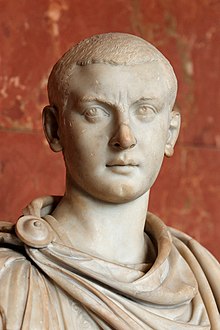
Gordian III (Latin: Marcus Antonius Gordianus Pius Augustus; 20 January 225 AD – 11 February 244 AD) was Roman Emperor from 238 AD to 244 AD. At the age of 13, he became the youngest sole legal Roman emperor throughout the existence of the united Roman Empire. Gordian was the son of Antonia Gordiana and an unnamed Roman Senator who died before 238. Antonia Gordiana was the daughter of Emperor Gordian I and younger sister of Emperor Gordian II. Very little is known of his early life before his acclamation. Gordian had assumed the name of his maternal grandfather in 238 AD.
In 235, following the murder of Emperor Alexander Severus in Moguntiacum (modern Mainz), the capital of the Roman province Germania Superior, Maximinus Thrax was acclaimed Emperor. In the following years, there was a growing opposition against Maximinus in the Roman senate and amongst the majority of the population of Rome. In 238 a rebellion broke out in the Africa Province, where Gordian’s grandfather and uncle, Gordian I and II, were proclaimed joint emperors. This revolt was suppressed within a month by Cappellianus, governor of Numidia and a loyal supporter of Maximinus Thrax. The elder Gordians died, but public opinion cherished their memory as peace-loving and literate men, victims of Maximinus’ oppression.
Meanwhile, Maximinus was on the verge of marching on Rome and the Senate elected Pupienus and Balbinus as joint emperors. These senators were not popular men and the population of Rome was still shocked by the elder Gordian’s fate, so the Senate decided to take the teenager Gordian, rename him Marcus Antonius Gordianus like his grandfather, and raise him to the rank of Caesar and imperial heir. Pupienus and Balbinus defeated Maximinus, mainly due to the defection of several legions, particularly the II Parthica, who assassinated Maximinus. However, their joint reign was doomed from the start with popular riots, military discontent and an enormous fire that consumed Rome in June 238. On July 29, Pupienus and Balbinus were killed by the Praetorian Guard and Gordian proclaimed sole emperor.
Rule
Due to Gordian’s age, the imperial government was surrendered to the aristocratic families, who controlled the affairs of Rome through the Senate. In 240, Sabinianus revolted in the African province, but the situation was quickly brought under control. In 241, Gordian was married to Furia Sabinia Tranquillina, daughter of the newly appointed praetorian prefect, Timesitheus. As chief of the Praetorian Guard and father in law of the Emperor, Timesitheus quickly became the de facto ruler of the Roman Empire.
In the 3rd century, the Roman frontiers weakened against the Germanic tribes across the Rhine and Danube, and the Sassanid Empire across the Euphrates increased its own attacks. When the Persians under Shapur I invaded Mesopotamia, the young emperor opened the doors of the Temple of Janus for the last time in Roman history, and sent a large army to the East. The Sassanids were driven back over the Euphrates and defeated in the Battle of Resaena (243). The campaign was a success and Gordian, who had joined the army, was planning an invasion of the enemy’s territory, when his father-in-law died in unclear circumstances. Without Timesitheus, the campaign, and the Emperor’s security, were at risk.
Gaius Julius Priscus and, later on, his own brother Marcus Julius Philippus, also known as Philip the Arab, stepped in at this moment as the new Praetorian Prefects and the campaign proceeded. Around February 244, the Persians fought back fiercely to halt the Roman advance to Ctesiphon. Persian sources claim that a battle occurred (Battle of Misiche) near modern Fallujah (Iraq) and resulted in a major Roman defeat and the death of Gordian III. Roman sources do not mention this battle and suggest that Gordian died far away from Misiche, at Zaitha (Qalat es Salihiyah) in northern Mesopotamia. Modern scholarship does not unanimously accept this course of the events. One view holds that Gordian died at Zaitha, murdered by his frustrated army, while the role of Philip is unknown. Other scholars, such as Kettenhofen, Hartman and Winter have concluded that Gordian died in battle against the Sassanids.
Philip transferred the body of the deceased emperor to Rome and arranged for his deification. Gordian’s youth and good nature, along with the deaths of his grandfather and uncle and his own tragic fate at the hands of the enemy, earned him the lasting esteem of the Romans. The soldiers held Gordian in high esteem, as he had possibly sacrificed his life to save them in 244.
|





 Hermes is the great messenger of the gods in Greek mythology and additionally as a guide to the Underworld. Hermes was born on Mount Cyllene in Arcadia. An Olympian god, he is also the patron of boundaries and of the travelers who cross them, of shepherds and cowherds, of the cunning of thieves and liars, of orators and wit, of literature and poets, of athletics and sports, of weights and measures, of invention, and of commerce in general. His symbols include the tortoise, the rooster, the winged sandals, the winged hat, and the caduceus (given to him by Apollo in exchange for the lyre).
Hermes is the great messenger of the gods in Greek mythology and additionally as a guide to the Underworld. Hermes was born on Mount Cyllene in Arcadia. An Olympian god, he is also the patron of boundaries and of the travelers who cross them, of shepherds and cowherds, of the cunning of thieves and liars, of orators and wit, of literature and poets, of athletics and sports, of weights and measures, of invention, and of commerce in general. His symbols include the tortoise, the rooster, the winged sandals, the winged hat, and the caduceus (given to him by Apollo in exchange for the lyre).


